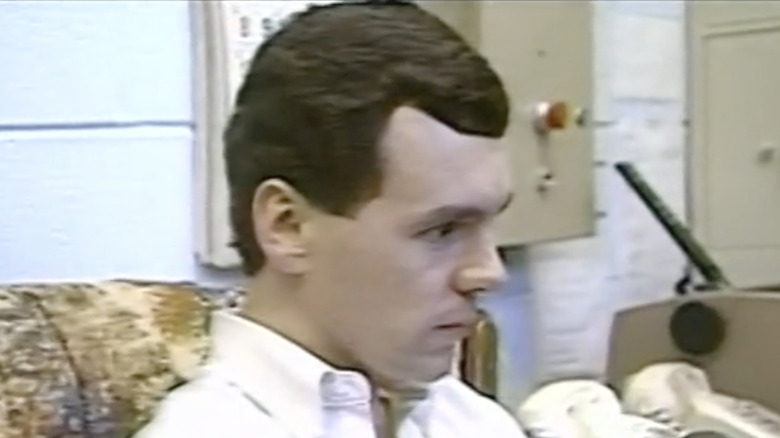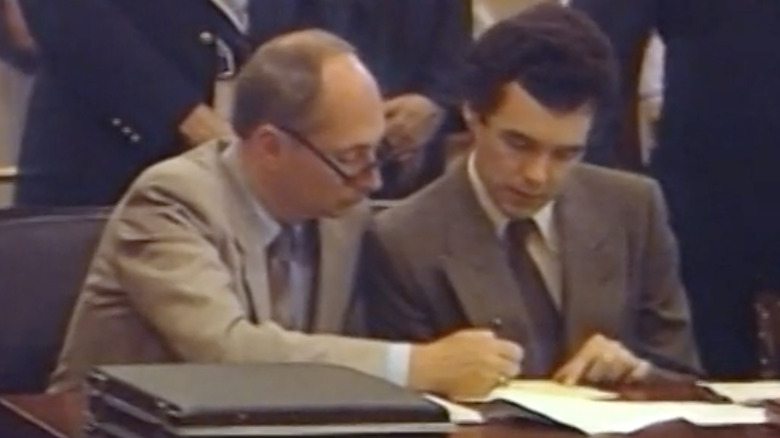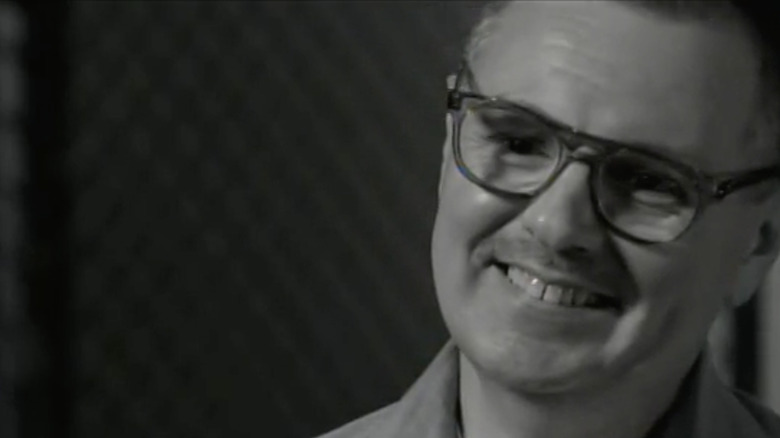How Serial Killer Donald Harvey Was Able To Get Away With Murder For So Long
Donald Harvey is one of the most prolific serial killers in the United States. When finally brought to justice, prosecutors had no eyewitnesses and little physical evidence. The death penalty was taken off the table in exchange for victims' names (via "Caring to Death: A Discursive Analysis of Nurses Who Murder Patients"). But when asked by his lawyer, Harvey couldn't provide an exact number of victims — there were too many to remember. "People who have really looked into the case deeply, believe that Donald Harvey killed, in and out of hospitals as many as 130 people," says true crime author Jim Fisher (via Smithsonian Channel), "which makes him the most prolific serial killer in American history." He was convicted for 37 homicides.
Also called custodial killers, Harvey was an Angel of Death. These criminals use their status as medical personnel or caretakers to victimize vulnerable patients (via Aggression and Violent Behavior). Their justifications range from a desire for financial gain, revenge, moral ideologies, or feelings of sadistic empowerment (via "Overkill: Mass Murder and Serial Killing Exposed"). While they'll lament their crimes were acts of compassion, that justification rings false when victims include healthy patients and acquaintances.
Angels of Death avoid detection in a number of ways, allowing their murder tally to grow. Kicking off his murdering career at 18 years old and with 15 victims his first year, Harvey's 17-year killing streak kept going until he said so.
Trust in medical staff
As trusted members of health care institutions, Angels of Death are rarely suspected of malicious violence. News of a health care worker's misdeeds is usually met with "disbelief and the dawning horror" at the incongruency of a healer purposely causing harm (via "Caring to Death: A Discursive Analysis of Nurses Who Murder Patients"). "Overkill: Mass Murder and Serial Killing Exposed" describes hospital homicides as "particularly difficult to detect and solve." People trust hospital staff, and what might in other settings seem like evidence of a crime is brushed aside. Even when there are suspicions, there's usually a lack of clear evidence (via "Caring to Death: A Discursive Analysis of Nurses Who Murder Patients").
These workers also have a unique ability to relocate, and employment mobility allows suspicions in one hospital to be wiped clean at the next. In 1985, Harvey was caught at the hospital where he worked with perhaps the most suspicious collection of would-be serial killer items (via Serial Killer Calendar). It included a book on the serial killer Charles Sobhraj, surgical scissors, gloves, books on the occult, hypodermic needles, and a .38-caliber pistol. Instead of any mark on his record, the Cincinnati V.A. Medical Center fined him $50 for the gun and asked him to resign quietly. Within eight months, he was at another medical facility and killed a known 23 more people.
Easy victims and killing methods
Serial killers are often predators who enjoy hunting their prey. But for Donald Harvey, there was no need to stalk his victims — they were delivered to his place of work (via Forensic Science International). Potential victims arrived at a trusted institution, into the care of professionals, and all with some malady that their death could be blamed on (via "Overkill: Mass Murder and Serial Killing Exposed"). Deaths are frequent with elderly patients and rarely arouse suspicion. The Angel of Death serial subtype allows for their victims' deaths to appear unremarkable. In addition, organized killers such as Harvey are careful in their victim selection to avoid detection (via "Mindhunter"). The organized Angel of Death killer has the potential for long active periods.
Like other killer caretakers, Harvey employed poisons and/or asphyxiation on his victims (via Aggression and Violent Behavior). The doomed could be poisoned by arsenic, cyanide, or cleaning fluid delivered to feeding tubes or food or suffocated with a wet towel followed by a plastic bag (via "Overkill: Mass Murder and Serial Killing Exposed"). "I was like a MacGyver" he said as he described various methods and how each one allowed him to conceal the true cause of death (via "Mindhunter"). A sense of power, importance, and control accompanied his ability to decide the moment of death (via "Mindhunter").
Lackadaisical institutions
If you asked Donald Harvey, he might say he got away with murder because he's clever — more clever than doctors and other hospital staff (via "Caring to Death: A Discursive Analysis of Nurses Who Murder Patients). In actuality, those in positions of authority were all too happy to pass Harvey on to the next person when he showed signs of being a problem. At the age of 19, he had around 10 murders under his belt and confessed to Kentucky police. "I spilled it all," Harvey said in an interview with Cincinnati Post (per "Caring to Death"). "But they thought I was crazy." Harvey was picked up drunk and burglarizing, and the police chalked up his comments to incoherent ramblings.
The U.S. Air Force might be guilty of passing the buck as well, as Harvey received a general discharge with no specified grounds (rumor was they got wind of the police questioning regarding hospital deaths). And in another lost opportunity, as a patient himself, the medical community failed to recognize the danger he posed to others. After Harvey's discharge, he admitted himself for psychiatric treatment at a Veterans Administration Medical Center. His two months of treatment included a failed suicide attempt and 21 rounds of electroshock therapy (via Serial Killer Calendar). With no evidence of improvement, he was released and continued his killer caretaker career. Harvey wasn't a criminal mastermind so much as overworked administrators, reluctant to take responsibility, allowed a serial killer to slip away.
Getting caught late
In 1987, when a motorcycle crash victim had cyanide poisoning, the police polygraphed his family members and all the staff at Donald Harvey's hospital (via "Overkill: Mass Murder and Serial Killing Exposed"). At first, he resisted the polygraph, but he quickly buckled, describing the poisoning and homicide in a nine-hour confession. A local news broadcaster, Pat Minarcin, exposed evidence of other suspicious hospital deaths (via WCPO). Thanks to media attention, Harvey's murder charges went from 1 to 24. Harvey then stacked the number higher, confessing his 1970s teenage crimes. Evidence was scarce, with no eyewitnesses of the murders or any improper conduct. Like other serial killer nurses, Harvey's confession was necessary for a conviction.
While on trial, he seemed relaxed and joking with his attorney. Per "Overkill: Mass Murder and Serial Killing Exposed"), the prosecutor described how "he talked about killing people so matter-of-factly you'd think he was talking about going to the drugstore or ordering a sandwich." The weight of his crimes didn't register, which is perhaps why he doesn't remember each one. After interviewing Harvey about his 37 convicted murders, FBI profiler John Douglas concluded that the man "seemed to never have a second thought" (via "Mindhunter").
A killer combination
One analysis found only 2% of serial killers turn themselves over to authorities (via Forensic Science International). While there are convicted murderers who refuse to confess to their deeds, others seem to revel in discussing their experiences. In an Oprah Winfrey interview for a segment titled "nurses who kill," Donald Harvey demonstrated enjoyment and glee while telling stories about injecting poisons and suffocating victims. They canceled the episode because of the sick pleasure Harvey displayed during his retellings (via "Overkill: Mass Murder and Serial Killing Exposed"). "It was very riveting," Oprah Winfrey later described (via Cincinnati Magazine), "but I thought, 'Why glorify it?'"
Harvey was convicted of murdering 34 patients in 17 years across three hospitals and two states (via "Mindhunter"). His entry on Murderpedia only offers a range of 37 to 87 victims. His murder tally reached prolific status for numerous reasons. Angels of Death have easy access to feeble victims and inconspicuous murder weapons, victims usually have health issues, and no one wants to see the warning signs. We're left to wonder who else could have lost a loved one in the various hospitals Harvey traversed on his graveyard shifts.





